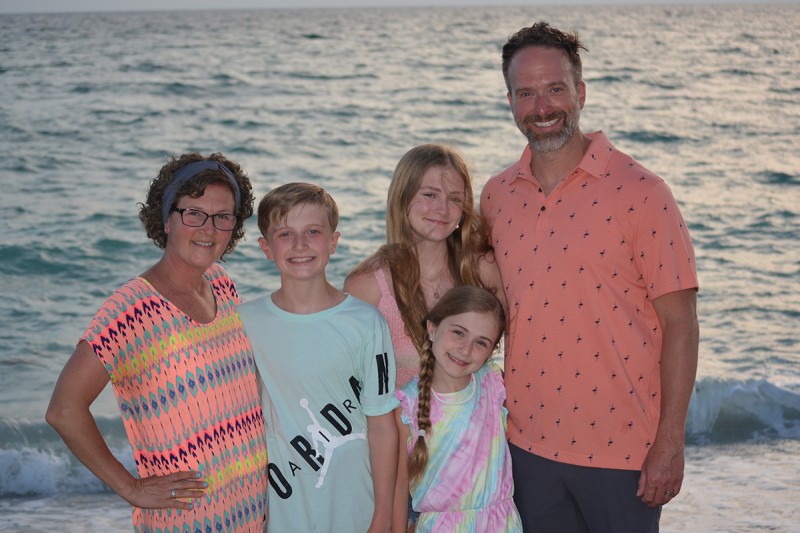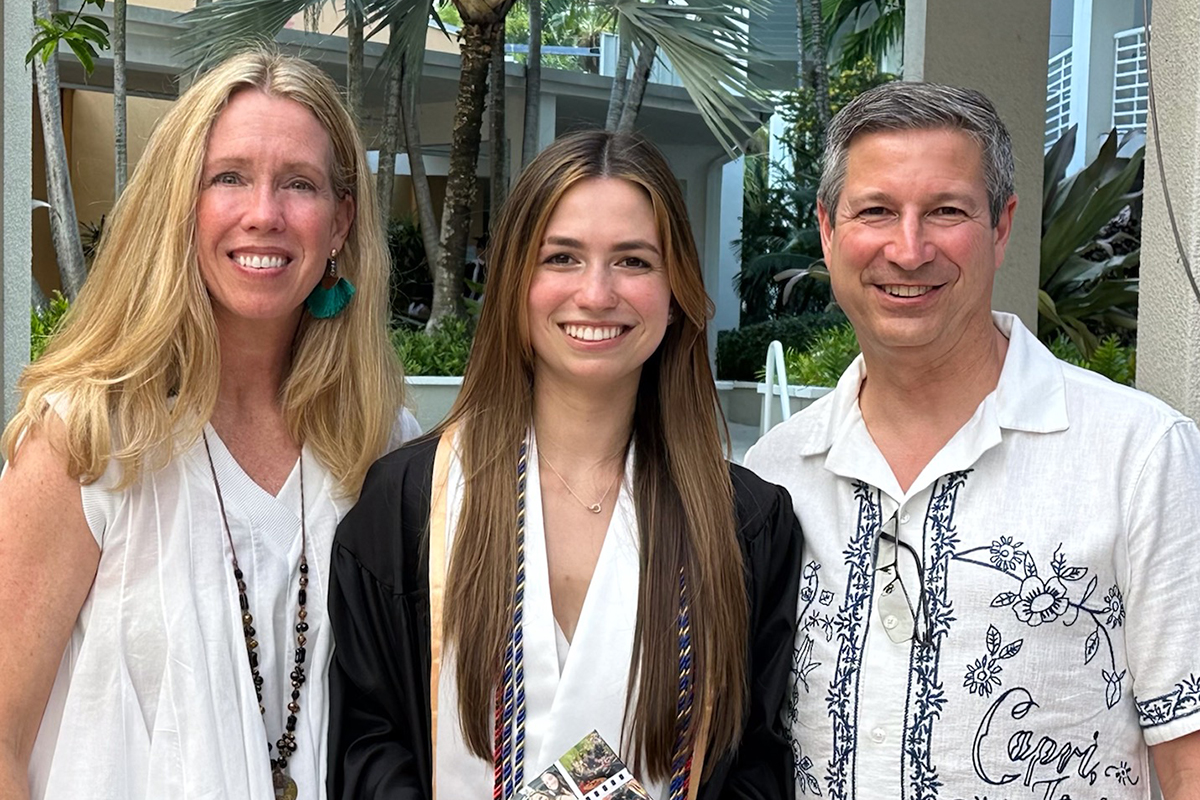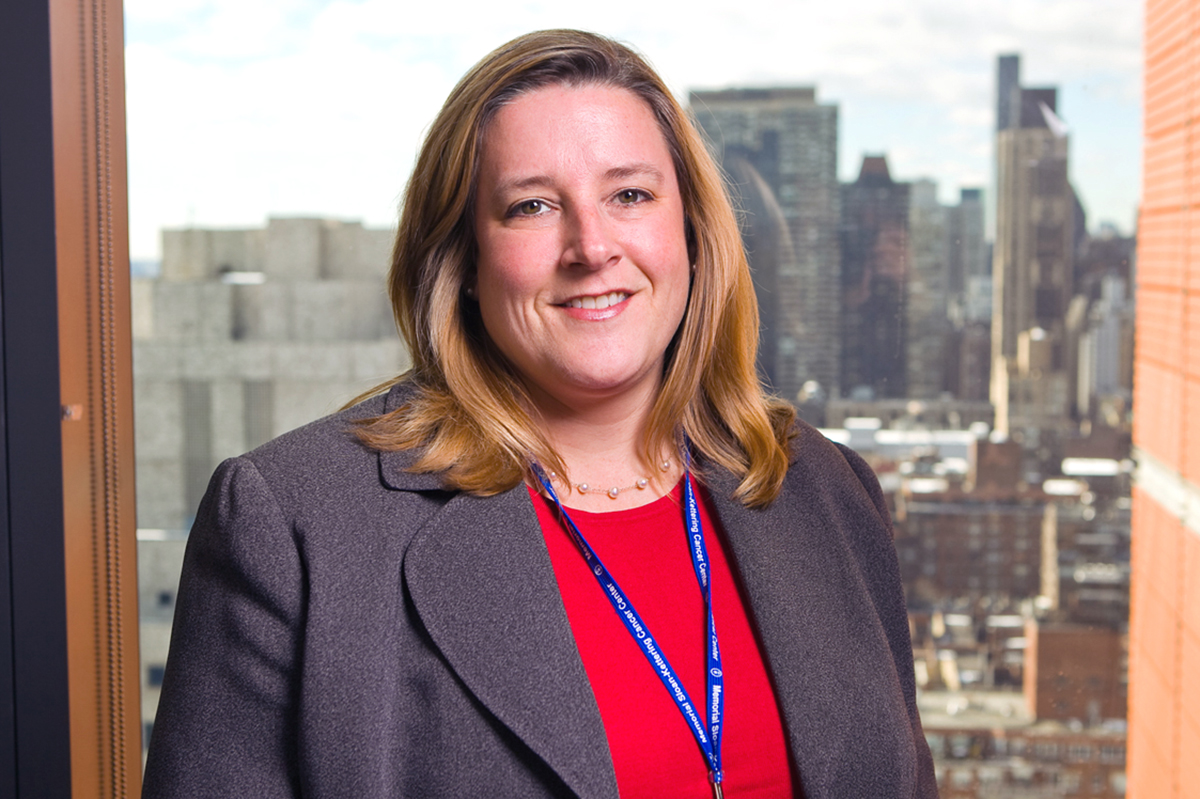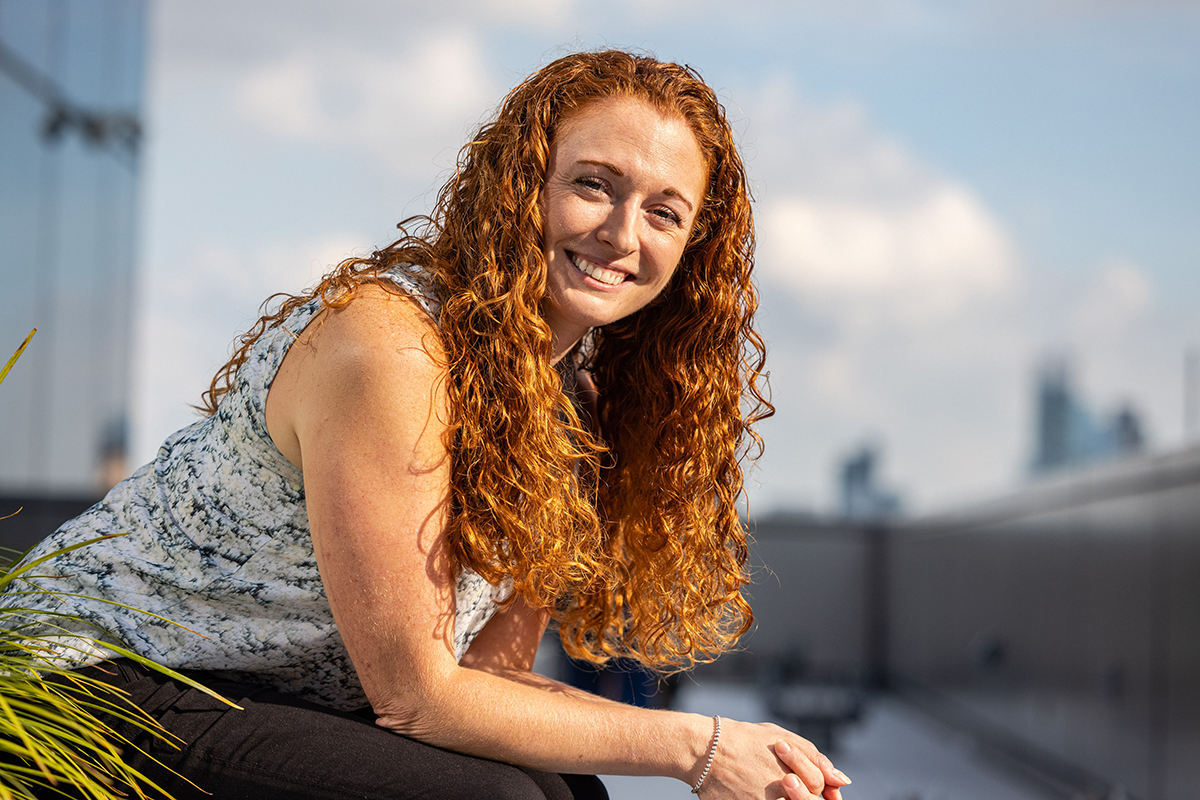
Majiel Baker (left) says traveling to MSK for breast cancer care was the ”best decision I could have made for me and my family,” including her husband Nathan (far right) and their children.
Majiel Baker faced a crucial decision when she was diagnosed with breast cancer after her very first mammogram at age 40.
Where should she go for treatment? Who should she trust to heal her?
Should she stay local, near her hometown of Clifton Park, New York? Or should she go where she thought she could get the best care, even if it meant traveling?
Many people confront similar decisions after learning they have cancer. Majiel had to consider her full plate at home, including three kids between the ages of 10 and 13 and her work as a middle school physical education teacher.
She also knew what was at stake, with a diagnosis of stage 2 invasive ductal carcinoma. “I felt my life was on the line,” she recalls. “I want to see my kids grow up. And I knew I would get the best medical care at Memorial Sloan Kettering Cancer Center (MSK).”
For Majiel and her husband, Nathan, an investigator for the New York State Police, that would mean a three-hour drive each way. The Canadian border is closer to their home than New York City, where MSK is based.
Would traveling to MSK for cancer care be worth it?
Looking back, Majiel recalls, “MSK was the best decision I could have made. I know I was in the top medical hands.” Her care team included breast surgeon Mahmoud El-Tamer, MD, and breast oncologist Victoria Blinder, MD.
Just as important, Majiel notes: “Everyone there is really invested in what’s best for you. You don’t feel like you are just a number walking through a door at a local hospital. It’s worth the travel. It’s worth the time. It’s just a wonderful feeling.”
Why So Many People Travel to MSK for Cancer Care
Majiel is one of more than 2,000 people each year who travel over 150 miles for cancer care at MSK. In 2023, people came to MSK from all 50 states, as well as the District of Columbia, Puerto Rico, the Virgin Islands, and countries around the world.
MSK specialists have expertise in more than 400 types of cancer, meaning they can successfully treat everything from the most common cancers to the rarest and most challenging.
Research shows that people cared for at MSK and other highly rated cancer centers consistently have better outcomes than at community hospitals. Major contributors to that success at MSK are clinical trials, which are research studies that investigate new therapies or treatment approaches that may not be available elsewhere. MSK has the largest program of clinical trials for cancer in the northeast, and one of the largest in the country.
For example, many patients with HPV-positive throat cancer travel to MSK for clinical trials using a novel low-dose radiation treatment that avoids the often difficult side effects from standard protocols.
MSK also cares for children facing cancer at MSK Kids, which was specially designed with children, teens, and young adults in mind.
Why a South Florida Resident Chose Cancer Care at MSK

(From left) MSK patient Jennifer Gussikof, with daughter Ryan and husband Jason
Jennifer Gusikoff flew to MSK from her home in southern Florida the second time she was diagnosed with basal cell carcinoma, a form of skin cancer. “The first time, I had it on my chest and it was removed with Mohs surgery,” she says. “But I wasn’t comfortable at all with the experience. And when I was diagnosed with the same cancer on my nose, I wanted better care.”
Jennifer contacted doctors in Miami and near her home in Palm Beach Gardens, Florida. “There are many great doctors in South Florida,” she says. “But time after time I was told I would have to wait. And in some cases, communication with the office staff left me pretty discouraged.” Eventually, she turned to MSK, where friends and family in Florida and New York had good experiences.
What she found at MSK was the “difference between night and day,” she says. “From the very start, everything at MSK was organized, clear, and prompt. Everyone I talked to was kind and helpful and really cared about me. It brought down the stress so much.”
Mohs surgeon Erica Lee, MD, and plastic and reconstructive surgeon Robert Allen, MD, were in charge of Jennifer’s care. “They were amazing,” she says. “They made sure I understood every step and presented options so I always felt comforted and in good hands.”
Jennifer says the entire MSK staff was focused on her peace of mind. “I stayed in a hotel near MSK. Every person I talked to — my care advisor, the office coordinator, and my doctors themselves — knew I was from Florida. They took steps to make my care easier as a traveling patient before I even asked. It was great.”
How MSK Helps Patients Who Travel for Cancer Care

Megan Dunne is Associate Clinical Director of the Patient Access Service (PAS) at MSK.
That level of care for traveling patients begins when a person first reaches out to MSK.
Many people start their MSK journey with a phone call to a Care Advisor in the Patient Access Service (PAS). The Care Advisor will help guide a person to the care that is best for them. Among many considerations is whether the person is traveling to MSK. “We try to be very mindful of what’s most important to a person,” says Megan Dunne, Associate Clinical Director of PAS. “Is it seeing a doctor quickly? Or, do you want to plan a really comprehensive visit that will include all your initial treatment?”
Scheduling Appointments
That consideration extends to scheduling appointments. Majiel says, “We told MSK people, ‘We’re traveling from far away, and it would help us so much if I could have my appointments early on Monday mornings.’ They were always wonderful with accommodating those needs.”
Travel and Lodging
PAS also determines if a person may need assistance with issues such as accommodations and travel. “We have resources such as hotels with MSK discounts and tips for getting around,” says Megan. “MSK social workers also help navigate concerns, including financial and insurance questions.”
Learn more about how we help people who travel to MSK for cancer care
MSK Regional Locations
Some people who travel to MSK also find it very convenient to use MSK’s regional locations outside New York City, where they can receive chemotherapy and radiation treatments, scans and blood work, and meet with their doctors for consultations and checkups.
People who live north of New York City, for example, often use MSK Westchester, located in a suburb outside the city, or MSK Bergen, in northern New Jersey. People who live south of the city, such as patients coming from the Washington, D.C., area and elsewhere, often travel for treatment to MSK Monmouth and MSK Basking Ridge, in New Jersey. MSK also has locations in Long Island at MSK Nassau and MSK Commack.
Telemedicine and Referrals
In some cases, a person may not need to be on-site at MSK.
“Sometimes our doctors can offer telemedicine visits, including a very robust consultation,” says Megan. “In other cases, we reach out to one of our physicians about a person and our doctor will say, ‘There’s a really great clinical trial that MSK is leading, and it’s also being conducted in that person’s state.’ Our doctor recommends that the person go to the hospital that’s very close to their home and participate in the clinical trial instead of traveling to MSK.”
Megan continues: “It may sound counterintuitive for MSK to recommend that a person go to another institution for care, but we want what is best for that person. That’s what we mean when say MSK is patient-centered.”
Coordinating Cancer Care Close to Home
MSK’s focus on the patient also extends to giving care close to home, if possible. Surgery for Majiel was performed at MSK and so are six-month checkups. But chemotherapy and radiation were provided by physicians in her hometown, in close consultation with MSK. “Dr. Blinder gave a treatment plan to a team of cancer doctors in my town, and they carried out the chemotherapy and radiation,” explains Majiel. “That way, I didn’t have to travel as much, which was easier for my family.”
MSK also uses technology, where possible, to stay connected when patients return home. “The resources I received from MSK are unbelievable,” says Majiel, who took part in the MSK Healthy Living program, which aims to help people live their best lives during and after cancer treatment.

Kylie Rowed, exercise physiologist at MSK
“Specialists from the program would do telemedicine visits with me to go over diet and nutrition information and see how I was doing,” Majiel explains. “It was so great to have a team.” A particular highlight was MSK exercise physiologist Kylie Rowed. “I’m a phys ed teacher,” says Majiel, “but I don’t know about cancer. Kylie showed me exercises on telemedicine visits for joint pain, which is common during treatment. It really makes me feel cared for.”
For people facing cancer, the decision about where to seek care is deeply personal, and traveling is one option among many. After 30 years of working at MSK, including as a nurse practitioner, Megan Dunne’s advice for people facing cancer and their loved ones is straightforward: “Pick up the phone and talk to us. Whether you come to MSK or not, we want to help you.”